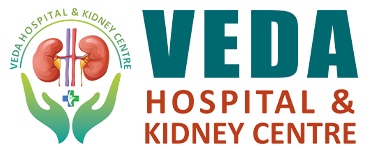Pregnancy Kidney Disease Treatment in Vijayawada
What is Pregnancy Kidney Disease?
Pregnancy Kidney Disease refers to kidney complications that either arise during pregnancy or are pre-existing kidney conditions that worsen during gestation. This condition requires close monitoring and specialized care as it can impact both maternal and fetal health. The kidneys, which play a crucial role in removing waste and balancing fluids, come under added stress during pregnancy. In some women, this additional burden can lead to significant kidney issues.
Understanding the Connection Between Pregnancy and Kidney Health
Pregnancy naturally induces physiological changes in the body, including increased blood flow and filtration rates in the kidneys. While most healthy women adapt to these changes, those with underlying renal issues or risk factors may face serious complications. Kidney disease can interfere with the body's ability to regulate blood pressure and manage waste, both of which are critical during pregnancy.
Dr. M.V. Viswanath, a leading Pregnancy Kidney Disease Treatment Doctor in Vijayawada, specializes in managing complex kidney conditions during pregnancy. At Veda Hospital & Kidney Centre, a premier Pregnancy Kidney Disease Treatment Hospital in Vijayawada, comprehensive diagnostic and treatment approaches are available to support maternal and fetal well-being.

Common Causes of Pregnancy Kidney Disease
- Pre-existing Kidney Conditions: Women with chronic kidney disease (CKD) are at higher risk during pregnancy.
- Preeclampsia and Eclampsia: These hypertensive disorders can impair kidney function.
- Urinary Tract Infections (UTIs): Recurrent UTIs can escalate into kidney infections, especially in pregnancy.
- Gestational Hypertension: High blood pressure during pregnancy can strain the kidneys.
- Diabetes: Gestational or pre-existing diabetes increases the risk of renal complications.
Symptoms of Kidney Disease in Pregnancy
The symptoms of kidney disease during pregnancy may overlap with normal pregnancy discomforts, making diagnosis more challenging. Some common symptoms include:
- Swelling in legs, ankles, or face
- Persistent fatigue and weakness
- High blood pressure
- Foamy or bloody urine
- Reduced urine output
- Frequent urinary tract infections
Diagnosis of Pregnancy-Related Kidney Disease
Accurate diagnosis is essential for effective management. At Veda Hospital & Kidney Centre, diagnostic tools include:
- Urinalysis to detect protein or blood in the urine
- Blood tests for creatinine and glomerular filtration rate (GFR)
- Ultrasound imaging to evaluate kidney size and structure
- Blood pressure monitoring
Treatment Options for Pregnancy Kidney Disease
Treatment of kidney disease during pregnancy depends on the severity and underlying cause. The approach includes:
- Strict blood pressure control using pregnancy-safe medications
- Antibiotics for UTIs or infections
- Dietary modifications to reduce kidney load
- Close fetal monitoring to detect signs of distress
- Dialysis, if necessary, in cases of acute or chronic kidney failure
Dr. M.V. Viswanath ensures evidence-based, individualized care plans tailored to each patient’s condition and stage of pregnancy. As a trusted Pregnancy Kidney Disease Treatment Doctor in Vijayawada, he collaborates with gynecologists and neonatologists for comprehensive care.
Why Early Detection Matters
Early diagnosis and management of kidney disease in pregnancy can prevent severe complications like preterm labor, low birth weight, and maternal kidney failure. Routine antenatal check-ups and early attention to warning signs are crucial. Veda Hospital & Kidney Centre, recognized as a leading Pregnancy Kidney Disease Treatment Hospital in Vijayawada, emphasizes early intervention and patient education.
Risk Factors for Developing Kidney Disease During Pregnancy
- History of chronic kidney disease (CKD)
- High blood pressure or preeclampsia in previous pregnancies
- Family history of renal disorders
- Obesity and sedentary lifestyle
- Autoimmune conditions like lupus
- Multiple gestations (twins or more)
Preventive Measures
While not all kidney conditions can be prevented, certain measures can reduce the risk:
- Maintain optimal blood pressure and sugar levels
- Stay hydrated and follow a kidney-friendly diet
- Avoid over-the-counter medications without doctor consultation
- Attend all prenatal appointments regularly
- Seek prompt care for urinary symptoms
Role of Multidisciplinary Care
Managing pregnancy kidney disease often requires a team approach. At Veda Hospital & Kidney Centre, the care team includes nephrologists, obstetricians, dietitians, and fetal medicine specialists. This ensures comprehensive management and timely intervention for both mother and baby.
Why Choose Dr. M.V. Viswanath?
Dr. M.V. Viswanath brings years of experience in nephrology with a special focus on maternal kidney health. His compassionate and personalized care approach has earned him recognition as a top Pregnancy Kidney Disease Treatment Doctor in Vijayawada. His patients benefit from state-of-the-art diagnostic tools and continuous monitoring throughout their pregnancy journey.
Why Veda Hospital & Kidney Centre?
Veda Hospital & Kidney Centre stands out as a trusted Pregnancy Kidney Disease Treatment Hospital in Vijayawada offering holistic kidney care. With advanced infrastructure, 24/7 emergency support, and a patient-centric approach, it is a preferred destination for expectant mothers with renal concerns.
Frequently Asked Questions (FAQs)
Can I get pregnant if I have kidney disease?
Yes, but it depends on the severity and type of kidney disease. It’s essential to consult a nephrologist before planning pregnancy.
Is pregnancy kidney disease curable?
While not always curable, early detection and treatment can effectively manage symptoms and prevent complications.
What are the risks of kidney disease for my baby?
Risks include preterm birth, low birth weight, and in rare cases, developmental issues. Close monitoring helps mitigate these risks.
Can kidney disease worsen after pregnancy?
Yes, especially if left untreated. Postpartum follow-up is critical to ensure recovery and manage progression.
What tests should I undergo during pregnancy for kidney health?
Routine urine and blood tests, kidney ultrasounds, and blood pressure monitoring are essential for ongoing assessment.
Will I need dialysis during pregnancy?
Only in severe cases of kidney failure. The nephrologist will decide based on test results and clinical condition.
Are medications for kidney disease safe during pregnancy?
Some are safe, while others are avoided. Your doctor will prescribe pregnancy-safe options suited to your condition.
What lifestyle changes help manage kidney disease during pregnancy?
A balanced low-sodium diet, regular check-ups, adequate rest, and hydration play a vital role in disease management.
When should I see a Pregnancy Kidney Disease Treatment Doctor in Vijayawada?
Visit a specialist like Dr. M.V. Viswanath as soon as you notice abnormal symptoms or if you have a history of kidney issues.
Pregnancy Kidney Disease is a serious yet manageable condition with timely diagnosis and proper medical guidance. With specialists like Dr. M.V. Viswanath and the support of Veda Hospital & Kidney Centre, expectant mothers can receive the best care for their renal health. If you or a loved one is experiencing symptoms or managing pre-existing kidney conditions during pregnancy, reach out to a reputed Pregnancy Kidney Disease Treatment Doctor in Vijayawada for guidance. Choosing the right Pregnancy Kidney Disease Treatment Hospital in Vijayawada is the first step toward a healthy mother and baby.
Best healthcare providers

Unmatched Nursing Support

Top-notch Patient Care

Hospitable environment

Phenomenal intervention

